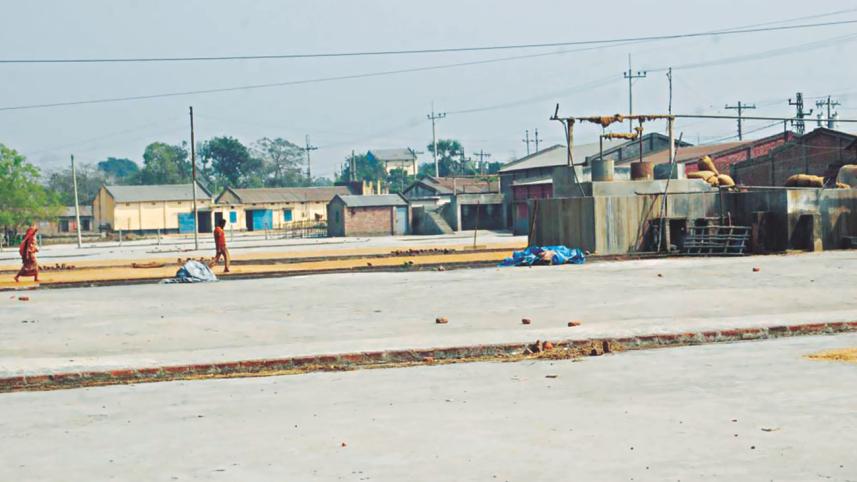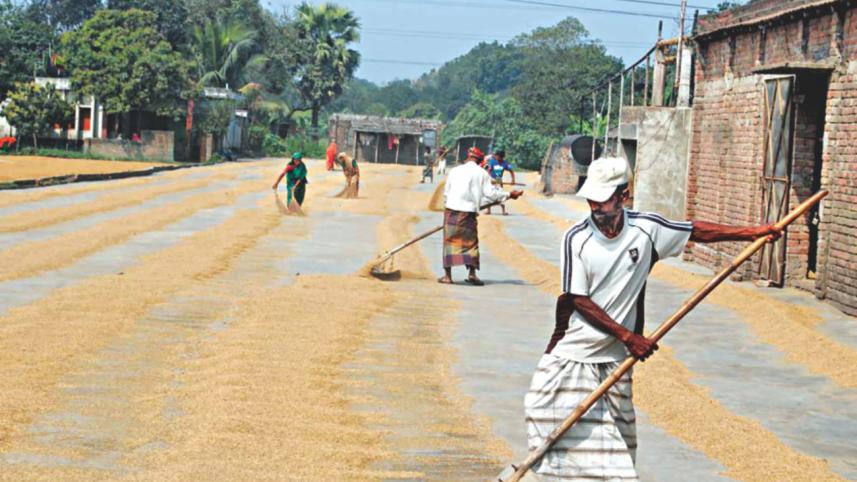Millers take brunt of blockade

Things may not seem that bad in the capital, but elsewhere the almost two-month-long blockade coupled with frequent hartal has hit every aspect of people's lives very hard. With inter-district communications snapped, businesses have come to a near-halt, education is in tatters, farmers are counting heavy losses and people venture out of their homes in constant panic. In this series, we look at how the blockade and shutdown are affecting public life outside Dhaka.
Like most businesses of the country, commercial rice milling in Pabna district has been hit hard by the ongoing blockade and hartals by the anti-government alliance.
Millers are counting hefty losses due to a sharp rise in transportation cost and drop in sales.
As a result, around 700 out of 800 rice mills in one of the largest rice producing districts of the country have been closed after the BNP-led alliance began the countrywide transport blockade on January 6, said Idris Ali Bishwas, president of Pabna Rice Mill Owners' Association.
Over 10,000 people have lost their jobs in the process, he told The Daily Star recently.
"Due to the shortage of transports, processed rice could not be sent to markets across the country. On the other hand, millers could not bring paddy from the wholesale markets to their mills," said Main Uddin, district food controller of Pabna.
The district's Ishwardi upazila alone has 650 rice mills, over 500 mills of which have been shut down since the blockade began, said Fazlur Rahman Malitha, president of Ishwardi Rice Producers' Association.
He said rice millers are incurring huge losses due to the fall in prices of rice. The rising volume of import of rice from India also dealt another blow.

Miller Touhidul Islam of Joynagar village said he had lost Tk 2 lakh as his mill was closed from January 10 to February 20.
"Over 200 sacks of rice, processed early January, have remained stacked in my warehouse. I cannot sell them due to a shortage of transports. As I could not sell rice, I can't buy paddy. So, I had to keep my mill closed."
However, Touhid last week bought some paddy in Jessore, but he had to count the transport cost twice the usual rate as most truck owners are not operating their vehicles, fearing attacks by blockaders. Opposition blockaders have firebombed and damaged over a thousand vehicles in their bid to cripple the country's communications and supply networks.
And those, who are operating vehicles defying the odds, are charging double the normal fare.
"Due to the rise in transport cost, the production cost of each sack of rice has increased by Tk 200-300," Touhid said. "On the other hand, local retailers are reluctant to pay the additional price. Rather, they are going for the cheaper rice imported from India."
At retail level, imported coarse rice is being sold at Tk 28-29 per kg while the local variety is being sold at Tk 35-36 per kg.
What's worse for Touhid is that he could not pay the installments of bank loans.
"In a normal situation, I would earn Tk 2 lakh a month. But now I earn nothing," he said, urging the political parties to resolve the current crisis as quickly as possible for the sake of businesses.
Mizanur Rahman Babu, also from Joynagar, has kept his mill shut for two weeks now.
"If I run the mill, I would face a loss of Tk 1.5-2 lakh every month. But if the mill is closed, then the loss will be Tk 30,000-40,000 … So, it is better to keep the mill shut," said Mizan.
The rice millers fear they would face an even direr situation if the political stalemate continues.
"If the [political] situation does not become normal soon, most rice millers would face huge financial losses, as they have to repay bank loans even if there is no production at all," said Idris of Pabna Rice Mill Owners' Association.




 For all latest news, follow The Daily Star's Google News channel.
For all latest news, follow The Daily Star's Google News channel.
Comments